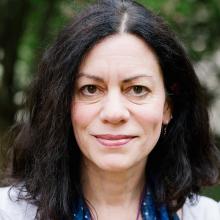Professor Sideris received her Ph.D. from Indiana University in 2000. Before coming (back) to IU, she taught both at Pace University in New York City and at McGill University in Montreal.
In the broadest sense, she is interested in the value and ethical significance of natural processes, as these values are captured or occluded by religious and scientific worldviews. Her areas of research include environmental ethics and the environmental humanities and the science-religion interface. Much of her early research focused on conflict and compatibility between scientific (particularly Darwinian) and religious interpretations of nature and natural processes. Her first book Environmental Ethics, Ecological Theology, and Natural Selection (Columbia University Press, 2003) critiques the tendency of Christian environmental ethics, or “ecological theology,” to misconstrue or ignore Darwinian theory, and examines the problems this creates for developing a realistic ethic toward nature and animals.
She is also interested in the legacy and ongoing relevance of environmental pioneer Rachel Carson, whose book Silent Spring (1962) arguably marks the beginning of the environmental movement in America and abroad. Sideris edited (with philosopher and nature writer Kathleen Dean Moore) a volume of interdisciplinary essays on Carson's life and work, titled Rachel Carson: Legacy and Challenge (SUNY Press 2008).
Her recent research has focused on the role of wonder in contemporary scientific discourse and its impact on how we conceive of and relate to nature. Her current book, Consecrating Science: Wonder, Knowledge, and the Natural World (University of California Press, July 2017) examines how scientific rhetoric and narratives about wonder actually pit science against religion, and encourage a devaluation of the natural world. Stories of the origin and evolution of our universe and our planet (the "Universe Story," or "Epic of Evolution") are emblematic of modes of "consecrated science" that, I argue, are environmentally and ethically problematic. Related to this, she is also interested in the mythic, religious, and ethical dimensions of the so-called Anthropocene. She currently leads a research project with scholars from three other Midwestern universities that investigate religious and ethical perspectives on being human in the Anthropocene.



